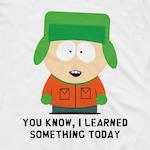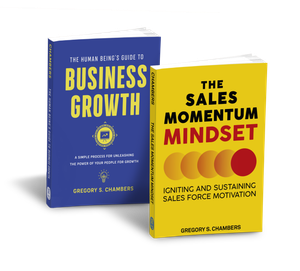Business Growth Ideas #305 This week: Energy, Confirmation, TIL

GREG'S BUSINESS GROWTH NEWSLETTER #300
Quick notes to help you grow your business in less time with less effort. . . sometime next week.
In this issue:
- Techniques for FIT
- Being Human
- Random Stuff
Techniques for FIT
- Entrepreneurs have more energy than the average person. One reason is because they use their perceived strengths more than most. It makes them happier too.
- Consider this when considering more monitoring of remote employees. It's easy to see the costs of a remote employee's non-compliance, and it's hard to recognize the benefits, like innovation. One is immediate, the other takes time.
- If you're struggling with new product adoption, are you merging into an existing workflow, or are you trying to impose your product/company/sensibilities on your prospect? Merging into their workflow is the best start.
- Keep perspective. When it's good, it's not all that good. When it's bad, it's not all that bad. As my lovely bride said once, "stop catastrophizing." Yeah. What she said.
Being Human - Decision making in the wild ------------------------------------------------------------
“In these matters, the only certainty is that nothing is certain"
–Pliny the Elder

I read this presentation "Coordination Headwind: How Organizations Are Like Slime Molds" https://komoroske.com/slime-mold/ from fast-growing company Stripe's head of strategy, Alex Komoroske. It's good stuff.
As you know, the first part of the FIT framework is Focus. Leadership's ability to describe a clear vision for the future. For it to work it needs to be far enough out to be recognizable, but not close enough to see details. Your teams just work better when they have a standard to keep in mind. It reminds me of the "I need to get to Springfield" story.
The man sits down on the park bench with a heavy sigh and says, "I really need to get to Springfield." The woman on the other end of the bench looks over and says, "I can help with that, but I have questions." "Okay," he replies, "shoot."
"First, which Springfield? Illinois? Ohio? Michigan? Massachusetts? Pennsylvania? Next, when do you need to get there? Today? Tomorrow? Next week? Before you die? What kind of budget do you have?"
When telling the story in a workshop I'll drag it out to make the point if every port is a destination, the ship doesn't know where to go. It's hard to make a decision. You want your teams to have the tools to operate independently in the face of a headwind. The way they do that is by having a destination they understand. You want them to stop and say to one another, "If we want to get to Springfield, Massachusetts by December 15, 2021, we need to keep this general direction." The details of the trip don't matter as much as the destination.
Focus allows your organization to keep pressing ahead, despite the coordination headwinds which come about from adding layers of people and complexity. Focus isn't a goal or outcome, it's a general place. We use it like a point on the horizon and aim at it.
If you're thinking through this at home, use this template to get started on how to describe your organization's Focus:
The world will look like X, my customers will be doing Y, and we'll provide value to them doing Z.
It's detailed enough to help with decision-making, but not specific enough to let headwinds take them too far off course. It allows for deviation in the face of coordination challenges, and lets your people make decisions as things change.
Coordination headwinds, Dorothy? “You always had the power my dear, you just had to learn it for yourself.”
Good stuff.
Random stuff
"TIL what TIL is."

I enjoy listening to podcasts. I listen to them while exercising, when tottering about in the yard, and I enjoy their company on my little road trips. This week I bumped into a gem, the Paris Review podcast. I listened to the 20th while raking leaves and enjoyed it so much I started the series at #1. It's great.
Listening to a podcast can make me feel smarter, although I know it's mostly a Dunning-Krueger thing. It makes me an inch deep, mile wide on a lot of topics, which is annoying to people who know a lot about the topic. (but makes for fun conversation) This week I listened to an interview with a favorite author, Susan Orlean. She has a new book of essays on animals and, as expected, it has many funny stories. Things I didn't know - chickens have personalities, boxer dogs actually box, the people who put the whale in Free Willy didn't expect the audience to say, "Hey, I'm good donating to animal rescue places but what about THAT whale?"
I listen to this while rowing and cluck my approval. I am trying to fix my rower's technique by not strapping my feet in, and it's distracting. The speedometer on the rower measures your average time for 500 meters. Right now it's stuck at 2:12ish and because it's an average, it takes a bit of effort to get it lower. My goal is to someday get my 5,000 meter row under 20 minutes, which isn't great, but it's ok for a self-taught rowing guy in his home office listening to podcasts.
As Ms. Orlean talks about her surprises, she says, "I did not know that, but maybe should have figured it out" which I take as a reminder to myself to check on a glitch in my speedometer. The time goes down by 1 as I pull faster. The fastest I can get the thing is into the mid 1's. The issue is when I'm around 2:01, 2:00 etc, it jumps over the 1.99, 1.98 etc and straight down to 1:58. At that rate my heart about pops out of my chest and I can barely breathe. This makes it hard to remember to research the problem but not this time.
Googling my issue I see there is a gap in all the averages. I am looking at the 5000 meter times for 50 year olds and there it is. 2:02, 2:01, 2:00, 1:59, 1:58. . .where is 1:99? 1:98?
I know. I know. I get it now. Chickens have personalities, boxer dogs box, and today, I remembered a clock doesn't count seconds down from 100 to one.
Sometimes it's a wonder people trust me with anything of value.
------------------------------------------------------------If you need to set up a time to visit, follow this link:
https://calendly.com/chamberspivot/





